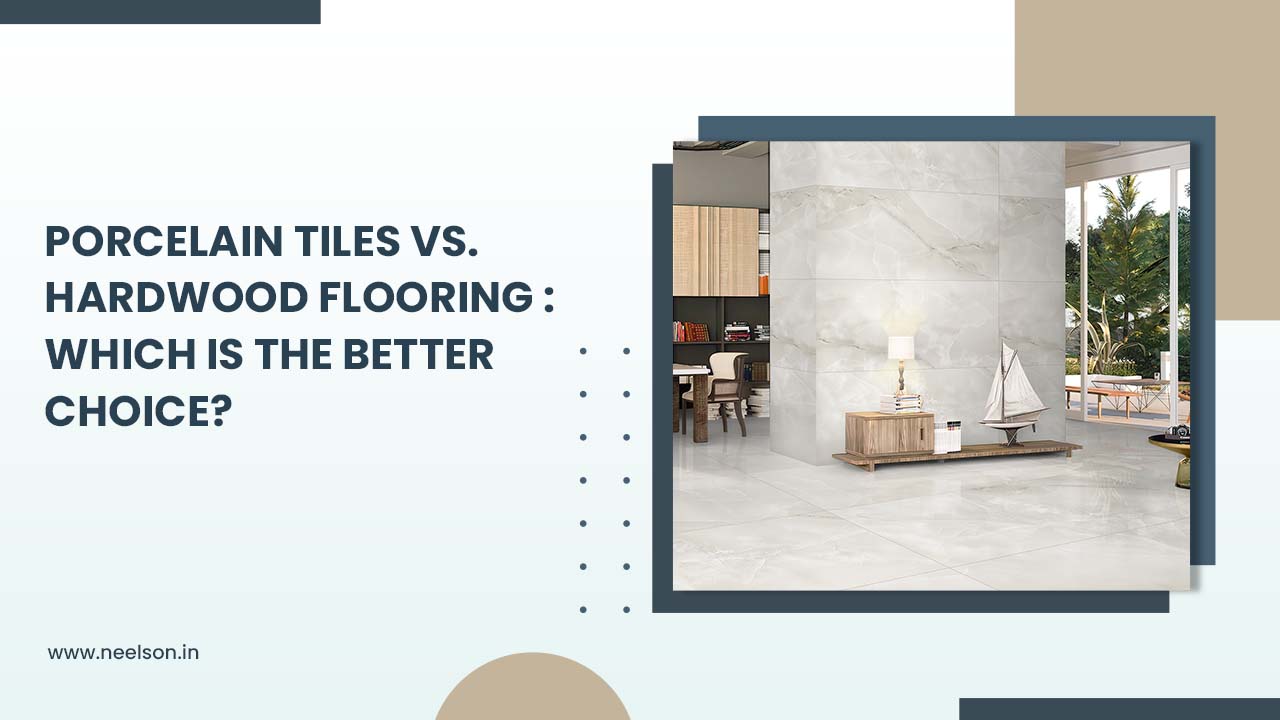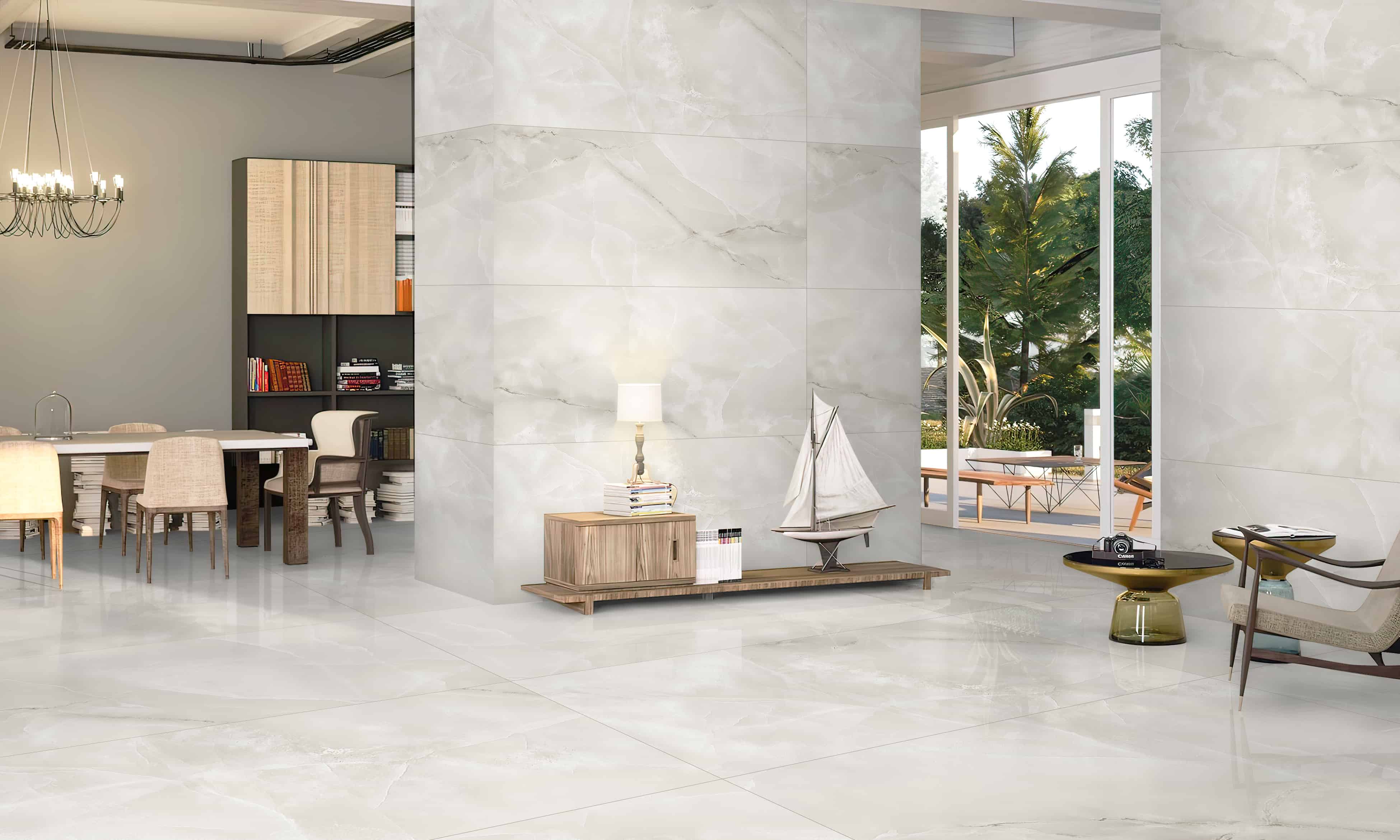
Because of their timeless beauty and resilience, wooden flooring has long been a favorite. However, it might not be the greatest choice if upkeep and cost are issues for you. Hardwood flooring has disadvantages, even though it can endure a long time and even get better with age.
Wood-look porcelain tiles can help with that. Although these tiles have numerous advantages, they appear like real wood. They are gaining popularity as a substitute for engineered wood and hardwood floors. You've come to the right place if you've been wondering why so many homeowners are switching.
We have been in the ceramic manufacturing industry for quite a long time, especially producing porcelain tiles. Neelson Ceramic is the leading porcelain tiles manufacturer. We hereby break down the essential aspects of both types of flooring options. Let us conduct a detailed analysis to determine which type of flooring option is best for your living space.
Design, Aesthetics, and Versatility
Porcelain Tiles
The adaptability of porcelain tiles is praised. Because of sophisticated manufacturing procedures, they can resemble natural materials like stone, marble, or even wood. Because they are available in various colors, patterns, and finishes, porcelain tiles offer countless options for contemporary, minimalist, or rustic decor. Porcelain tiles may accommodate your preferred style, whether it's a rough, matte surface or a smooth, glossy appearance.
Hardwood Flooring
Hardwood floors have a classic charm and coziness. Each plank has a distinct grain pattern and natural tone and comes in various wood types, including oak, maple, and walnut. Hardwood acquires a patina with time, giving the room personality. Although its timeless appeal is unrivaled, additional care may be needed to preserve its aesthetic appeal due to its restricted color selection and scratch vulnerability.
Porcelain Tiles are more versatile, and hardwood flooring is better at showcasing its timeless beauty.
Durability and Longevity
Porcelain Tiles
One of the most resilient flooring materials is porcelain. Because it is non-porous, it resists stains, dampness, and scratches, guaranteeing its appearance will last many years. Porcelain tiles are an excellent option for busy homes or commercial areas because they are also very durable and can handle intense foot traffic.
Hardwood Flooring
Despite its durability, hardwood is vulnerable to water damage, dents, and scratches. To maintain its best state, it needs to be sanded and refinished regularly. Hardwood floors are a long-term investment, though, as they may endure for decades with the right maintenance.
Porcelain tiles are better for their high durability, while hardwood flooring is better for its long-term value with care.

Maintenance Needs
Porcelain Tiles
Porcelain tiles require very little upkeep. They don't need extra treatments because they are stain-resistant and can be cleaned with basic sweeping and mopping. Therefore, they are a great choice for bathrooms, kitchens, and other high-traffic areas.
Hardwood Flooring
Hardwood floors require additional care. Spills must be cleaned up every once to prevent discoloration, and routine sweeping is needed to prevent scratches from dust and debris. Refinishing is eventually necessary to bring back the wood's sheen, which increases the overall upkeep work.
Water and Moisture Resistance
Porcelain Tiles
Because of their water-resistant nature, porcelain tiles are perfect for moist places like kitchens, bathrooms, and outdoor settings. They maintain their integrity in damp environments since they do not distort or swell when exposed to water.
Hardwood Flooring
Hardwood is exceptionally vulnerable to dampness and humidity. Extended exposure may result in mold growth, swelling, or warping. While engineered wood resists moisture better than porcelain tiles, it is still inferior.
Porcelain tiles are better in terms of being more water resistant.
Comfort and Warmth
Porcelain Tiles
The tendency of porcelain tiles to feel cooler underfoot can be a benefit in hotter climes but a disadvantage in colder ones. However, they can be used with underfloor heating systems, which can successfully solve this problem.
Hardwood Flooring
Hardwood flooring is more hospitable in living areas and bedrooms because it naturally brings warmth and comfort. Additionally, it feels cozier in domestic situations since it is softer underfoot than tiles.
Porcelain tiles are better in summer due to their versatility. Hardwood is better if you want natural warmth.
Environmental Influence
Porcelain Tiles
Although natural clay and minerals are used to make porcelain tiles, production uses a lot of energy. However, over time, their lengthy lifespan minimizes their influence on the environment and lessens the need for replacements.
Hardwood Flooring
When sourced ethically, hardwood is an environmentally favorable option because it is a renewable resource. However, inappropriate harvesting methods and deforestation may have detrimental effects on the ecology. Selecting timber that has been certified and obtained sustainably lessens these issues.
In the case of sustainability and creating a better environmental impact, hardwood flooring is better.
Cost Factors
Porcelain Tiles
In general, porcelain tiles are less expensive upfront than hardwood. In the long term, their longevity and minimal maintenance costs make them a cost-effective choice, even though the installation can call for professional skills.
Hardwood Flooring
Because of the material and installation costs, hardwood flooring is usually more expensive. Furthermore, continuing upkeep like refinishing may raise the final cost. However, these expenses may be compensated for by their high resale value.
Porcelain tiles are the best in terms of affordability. At the same time, hardwood is better for resale value.
Resale Value and Visual Appeal
Porcelain Tiles
Porcelain tiles raise a home's value, particularly in spaces like kitchens and bathrooms where toughness and water resistance are essential. Although they are visually appealing, in certain real estate markets, they might not elicit the same sense of luxury as hardwood.
Hardwood Flooring
Hardwood flooring is a desirable feature in real estate. Buyers love it due to its timeless attractiveness and refinishing potential, which frequently raises a property's resale value.
Which is Better, Porcelain Tiles or Hardwood Flooring?
When Should You Choose Porcelain Tiles?
- Resilience against deterioration and longevity.
- Water-resistant and low-maintenance flooring.
- Designs that are both versatile and reasonably priced.
- Flooring for places with a lot of traffic or wetness.
When Should You Choose Hardwood Flooring?
- A classic, cozy style.
- Greater traditional charm and resale value.
- Cozy flooring for living areas and bedrooms.
- When supplied responsibly, it's an environmentally friendly choice.
Conclusion
Both hardwood flooring and porcelain tiles have advantages, so the choice should fit your aesthetic preferences, financial constraints, and way of life. Neelson Ceramic is a well-known porcelain tiles exporter specializing in high-quality porcelain tiles that satisfy the needs of contemporary living by fusing beauty, toughness, and usefulness. By looking through our selection, you may add long-lasting flooring to your room.
